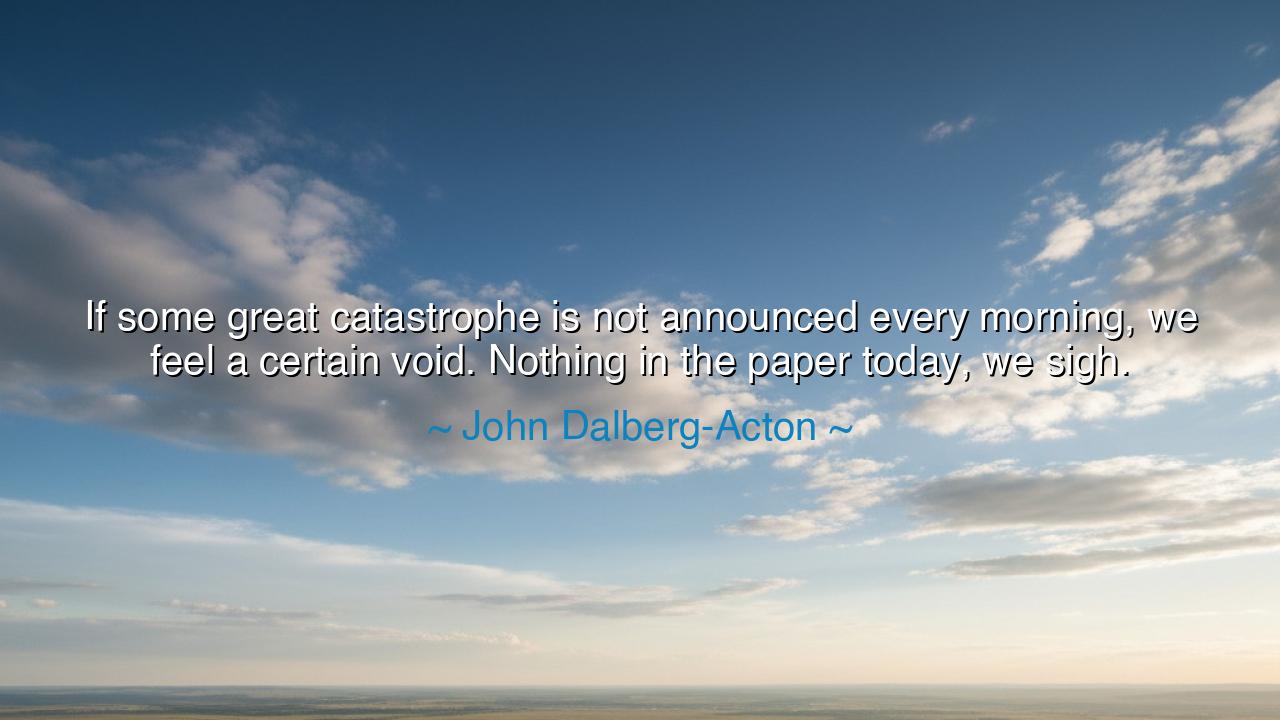
If some great catastrophe is not announced every morning, we
If some great catastrophe is not announced every morning, we feel a certain void. Nothing in the paper today, we sigh.






John Dalberg-Acton, the historian and moral philosopher often called Lord Acton, once wrote with piercing irony: “If some great catastrophe is not announced every morning, we feel a certain void. ‘Nothing in the paper today,’ we sigh.” Though spoken in reference to the habits of his time, these words reveal a truth that echoes across centuries: mankind has an insatiable thirst for calamity, a strange comfort in crisis, and an uneasy boredom in peace.
The heart of this saying lies in our relationship with catastrophe. We are drawn to it not only because it shakes the world, but because it shakes us out of the monotony of daily life. The mind, weary of repetition, craves drama. Thus, when the morning paper arrives without tales of war, scandal, or disaster, we feel as though something is missing. Lord Acton exposes this paradox: that human beings, while claiming to long for peace and stability, often measure the “importance” of life by the presence of turmoil.
This tendency has ancient roots. The Romans flocked to hear of rebellions on the frontiers or intrigues in the Senate, just as they flocked to the gladiatorial games. The Greeks gathered in the agora to debate disasters as though they were divine omens. Even in times of plenty, the people seemed to hunger for tales of ruin. Acton’s words remind us that the appetite for catastrophe is not a modern invention, but a timeless feature of the human heart — an uneasy mingling of curiosity, fear, and desire for drama.
History gives us clear examples. Consider the years of relative peace in Europe after the Congress of Vienna. Writers of the time often remarked on the “dullness” of politics, as though peace itself were a burden. Yet when revolution returned in 1848, when barricades rose in Paris and Vienna, newspapers found themselves alive again with drama, and readers devoured the chaos with grim satisfaction. What Acton observed was this same spirit: people sighing not at bloodshed itself, but at the absence of something “newsworthy” to stir their otherwise quiet lives.
The deeper meaning of this reflection is a warning. If we grow dependent on catastrophe for meaning, we risk becoming numb to peace and incapable of appreciating the quiet blessings of life. To sigh at the absence of disaster is to confess that we have forgotten the beauty of stability, the gift of ordinary days. Acton, with his historian’s eye, reminds us that societies built on a constant diet of turmoil lose the ability to cherish order, and thus often summon fresh chaos to fill the void.
The lesson for us is profound: we must learn to value stillness, to appreciate mornings when the world brings no calamity. For true strength is not only found in the courage to endure crisis, but in the wisdom to rejoice in peace. If our souls hunger only for drama, then we will never taste contentment. The man who can rise, read “nothing in the paper today,” and still give thanks, is the one who truly understands the fragile blessing of calm.
Practical action follows: guard your mind against the constant craving for disaster. Limit your fixation on calamity, and instead learn to recognize the miracles hidden in uneventful days — the laughter of a child, the calm of a sunrise, the silence of an unbroken morning. See that these are not voids but treasures, rare and precious. Train your spirit to rejoice in peace, lest you become enslaved by the endless appetite for ruin.
Thus, Lord Acton’s words endure as both satire and prophecy. If no catastrophe is announced, we feel a void, he wrote — but the wise know that this void is not emptiness, but abundance. Children of tomorrow, remember this: do not despise the quiet days, for in them lie the richest rewards. It is in peace, not in catastrophe, that the soul finds its highest growth.






AAdministratorAdministrator
Welcome, honored guests. Please leave a comment, we will respond soon